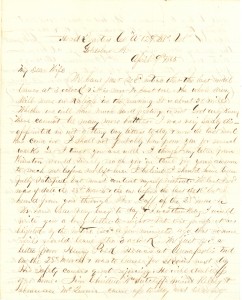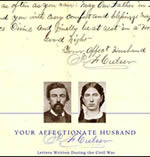 [google-map-v3 width=”400″ height=”300″ zoom=”12″ maptype=”hybrid” mapalign=”right” directionhint=”false” language=”default” poweredby=”false” maptypecontrol=”false” pancontrol=”false” zoomcontrol=”true” scalecontrol=”false” streetviewcontrol=”false” scrollwheelcontrol=”false” addmarkermashupbubble=”false” addmarkerlist=”35.385965; -77.996854{}1-default.png” bubbleautopan=”true” showbike=”false” showtraffic=”false” showpanoramio=”false”]
[google-map-v3 width=”400″ height=”300″ zoom=”12″ maptype=”hybrid” mapalign=”right” directionhint=”false” language=”default” poweredby=”false” maptypecontrol=”false” pancontrol=”false” zoomcontrol=”true” scalecontrol=”false” streetviewcontrol=”false” scrollwheelcontrol=”false” addmarkermashupbubble=”false” addmarkerlist=”35.385965; -77.996854{}1-default.png” bubbleautopan=”true” showbike=”false” showtraffic=”false” showpanoramio=”false”]
Head Quarters Co. “A” 129th Ills. Vols.
Goldsboro, N.C.
April 9th 1865
My Dear Wife
We have just recd. notice that the last mail leaves at 3 o’clock, and it is now 1/2 past one. The whole Army will move on Raleigh in the morning;1 it is about 50 miles. Whether we will have much hard fighting or not, God only knows. There cannot be many more battles.
I was very sadly disappointed in not getting any letters to-day; & now the last mail has come in, I shall not probably hear from you for several weeks. Yet I trust you are well. I thought my letter from Kinston [of March 24] would surely reach you in time for your answer to reach me before we left here. I believe I should have been fully satisfied but must content myself without. The last I recd. was of date the 23rd March & the one before the last the 16th, but I heard from you through Bro. Gaff of the 28th March.
We have been very busy to-day, & I was thinking I would write you a long letter to-night, but that prospect was blighted by the notice recd. a few minutes ago that no more mails would leave after 3 o’clock. We just recd. a letter from Henry Polk; he was at Annapolis, Md., on the 28th March & was to leave for St. Louis next day. His safety causes great rejoicing; he will doubtless get home.
Jim Chritten, Wm. Sutcliff, Winnie Kelley, & Sherman McQuown came up to-day. Mat DeLong will be here to-morrow.
We had a most excellent meeting this morning, & the Sacrament of the Lord’s Supper was administered. It was a blessed time. God grant that we may soon enjoy such a privilege at home with our loved ones. Wm. Bronson’s discharge papers came this morning, & he starts for home to-morrow. I do not think we will get to see him again. WE HAVE (I commenced a sentence but was interrupted & forgot what it was). Alf Huetson has just come in & brings glorious news. Genl. Grant has telegraphed us to move on Johnson[sic] & end this matter as soon as possible.2 Henry Snyder was sent to the rear yesterday sick;3 he is not very bad but was unable to march. All the troops are in good spirits & are tired of camp. We are well prepared for the campaign. The weather is beautiful.
I took my chair to the fire after breakfast this morning & reread & burned all your letters, 13 in all. It seemed sacriligious, but I could not run any risk of their falling into strangers’ hands. I wished very much to preserve them. I kept only the last one & hoped to place another in my pocket this afternoon & burn it, but I will carry this one to read occasionally.
We have just learned that John Harper has been exchanged so he will probably be at home soon.4 I find it almost impossible to write as there [are] so many questions to answer & things to attend to. Everyone is busy packing up. I will not get time or opportunity to write to the Sunday School or Church; I intended to do so this afternoon. You must remember me to them & tell them that I have been so very busy, but I have prayed for them every day since I left. I think Bro. Crist might have answered my letter but presume he had not time.
Give my kind regards to all my friends. I intended to write to Abbie & Lida Remick but have the same excuse to all. Want of time. My “Sentinel” has not come yet through. I saw one to-day of the 16th containing my Charleston letter full of mistakes. Before this reaches you, we will be beyond Raleigh, or at least fight[ing] for it.
We are to draw some clothing in a few minutes, & I must cut my letter short. There are so many things I wished to write about, but in the hurry I shall not be able. If it be Our Father’s will, I will make up for it when the campaign is ended. Be of good cheer, &, during the long weeks in which you may not hear from me, trust more in God. He will care for us. I feel that I can trust him wholly. If I should fall, we will certainly meet in a better and happier world, & you must teach Howard to remember me. Kiss him Good bye for me.
I feel very happy to-day knowing that God is ours and that his love is exercised toward us. I feel very thankful to our friends in Pontiac who are trying to make you happy by their kind attentions. Remember me particularly to Mrs. Johnson, Emily, Mrs. McGregor & family, Mrs. Smith, Lou, & all others who by their kindness comfort you in my absence. And now, dearest, I must say Good bye for a short time. Kiss Howard occasionally for me. I commit both you & him to the kind care of Our Father in Heaven. Write often. Should communication be kept open, I might possibly hear from you, & at all events, I will get them when the campaign closes. By orders just recd. our letters must be directed as follows.
May the richest of Heavens blessings rest upon you. With a kiss and much love, I remain through life,
Your affect. Husband
J. F. Culver
(Kiss)
Co. “A” 129th Ills.
1st Brig., 3d Div., 20th A.C.
Army of Georgia
Fortress Monroe
- General Mower on the 8th had notified his division commanders that at daylight on the 10th they would start for Smithfield, taking the river road. The First Division would have the lead. Each division would be accompanied by its ambulance and tool wagons, and ten ammunition wagons. The remainder of the train, with the exception of four artillery ammunition wagons, would follow the XIV Corps trains. O. R., Ser. I, Vol. XLVII, pt. III, pp. 132, 145. [↩]
- The dispatch referred to is probably General Grant’s Burkeville telegram of April 6 which read, “We have Lee’s army pressed hard, his men scattering and going to their homes by the thousands. He is endeavoring to reach Danville, where Davis and his cabinet have gone. I shall press the pursuit to the end. Rush Johnston at the same time and let us finish up this job all at once.” Ibid., p. 109. [↩]
- For data on Henry Snyder see J.F.C.’s letter of March 24, 1865. [↩]
- John A. Harper, a 21-year-old carpenter, was mustered into service on Sept. 8, 1862, as a corporal in Company G, 129th Illinois Infantry. Corporal Harper served with the regiment throughout the war. Compiled Service Records of Union Soldiers, NA. [↩]

 Subscribe via RSS
Subscribe via RSS Subscribe via Email
Subscribe via Email